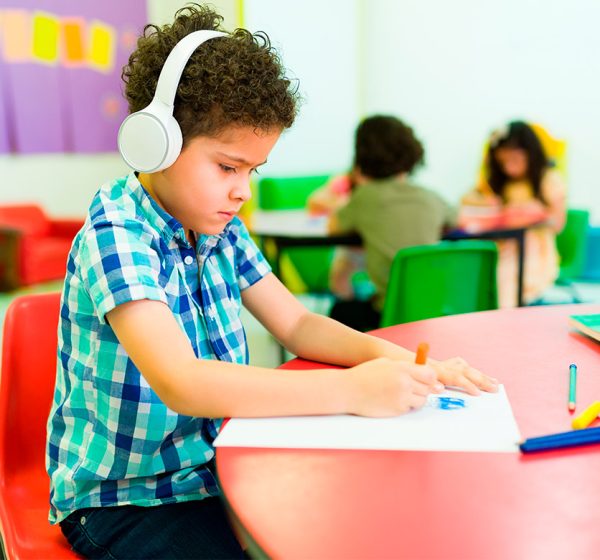Cognitive skills, such as memory, attention, reasoning, and decision-making, form the essential foundation for a child’s growth, learning, and future success. Cognitive development enables children to process information, understand their world, and develop independence. When these fundamental skills develop properly, children thrive in school, relationships, and everyday activities. It helps children follow instructions, solve problems, regulate behavior, and make decisions that guide their learning experiences.
In the Rio Grande Valley, many children face unique challenges that can impact cognitive development, including limited access to specialized healthcare, socioeconomic barriers, and educational resource gaps. These obstacles can delay the development of critical thinking and problem-solving abilities necessary for academic success. These obstacles can also have long-term effects on academic performance, social interaction, and independence.
Early intervention through pediatric occupational therapy has proven remarkably effective in addressing these challenges during a child’s most formative years. By targeting these skills through play-based approaches, occupational therapists help children build the cognitive foundation needed for lifelong learning and independence.
What Is Pediatric Occupational Therapy?
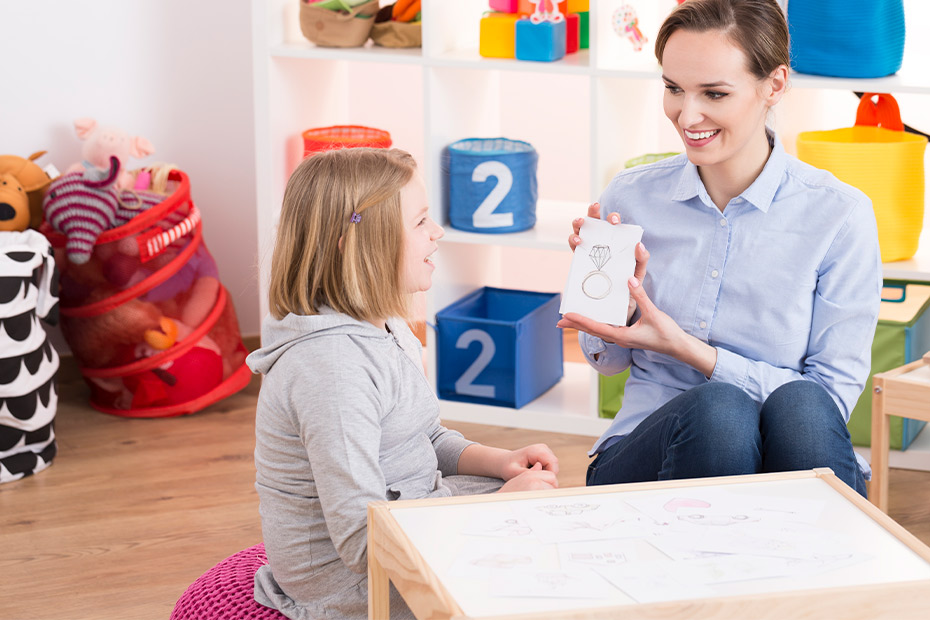
Pediatric occupational therapy (OT) is a branch of healthcare that helps children overcome developmental barriers affecting their ability to perform everyday tasks. While many think of OT in terms of physical rehabilitation, its cognitive benefits are equally important, especially for children facing attention deficits, memory difficulties, or executive functioning delays.
OT focuses on helping children participate in activities that are meaningful and necessary for their development, using customized strategies that often feel like play but are rooted in evidence-based techniques.
Key Components of Pediatric OT for Cognitive Growth
Each of the following points outlines a fundamental component of how occupational therapy supports the development of cognitive skills in children within an educational and therapeutic framework:
- Comprehensive Assessments:
Therapists begin by evaluating a child’s cognitive abilities using standardized tools and observations. This helps identify challenges in areas like short-term memory, attention span, or decision-making. - Individualized Treatment Plans:
Interventions are tailored to each child’s cognitive profile. A child who struggles with working memory might work on sequencing tasks, while another with poor impulse control might engage in structured decision-making games. - Structured Play:
Play-based activities such as puzzles, obstacle courses, or storytelling help stimulate brain development. These activities engage attention, reasoning, and planning in a way that feels enjoyable and natural for the child. - Goal Setting and Monitoring:
Therapists work with parents and educators to set cognitive goals and monitor progress over time, adjusting interventions as needed.
Occupational therapists use fun, familiar tools, like toys and games, to achieve serious developmental outcomes.
Cognitive Skills Targeted Through OT
Occupational therapy employs structured, play-based activities designed to strengthen specific areas of cognitive functioning. These activities are enjoyable for children and serve as strategic interventions that support brain development and learning readiness. The table below highlights key cognitive skills commonly addressed in pediatric OT, the therapeutic activities used to target each skill, and the expected developmental outcomes.
| Cognitive Skill | OT Activity | Skill Outcome |
| Working Memory | Story recall games, matching card tasks | Better retention of instructions and school material |
| Attention Control | Visual tracking games, focused movement tasks | Increased classroom focus and reduced impulsivity |
| Executive Functioning | Step-based tasks like cooking or building | Improved planning, organizing, and task sequencing |
| Decision-Making | Role-playing, option-based games | Greater independence and logical thinking |
Regional Challenges in the Rio Grande Valley
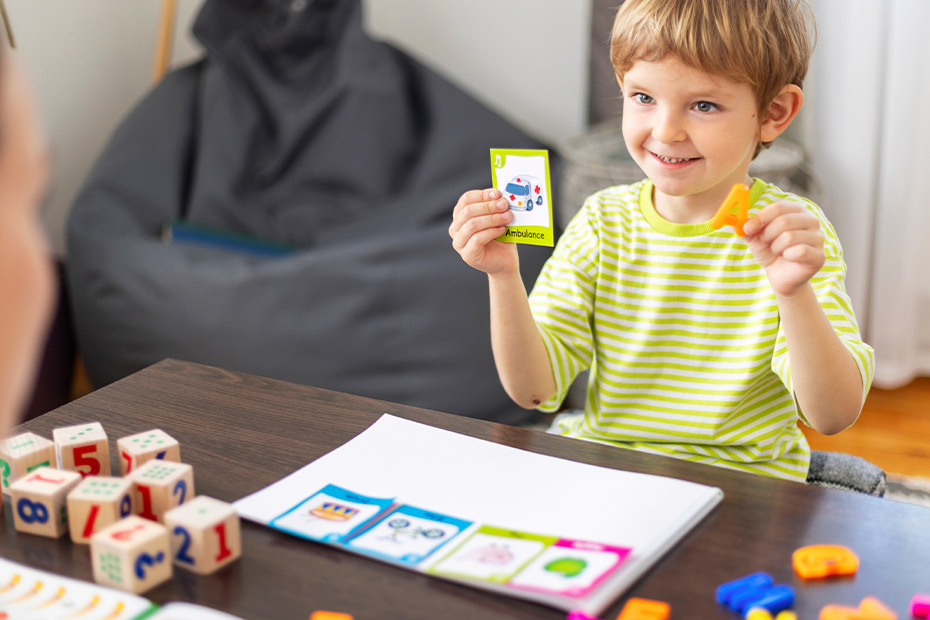
Children in the Rio Grande Valley face several challenges that may delay the natural development of cognitive functions. These obstacles aren’t always related to the child but stem from environmental and social barriers.
Key Barriers to Cognitive Growth:
- Limited Pediatric Services:
Access to specialists like occupational therapists or developmental pediatricians can be limited, especially in rural or underserved areas. - Socioeconomic Stressors:
High poverty rates often correlate with limited educational resources at home, such as books, safe play areas, or parental availability due to work demands. - Educational Resource Gaps:
Some schools may lack the personnel or training to spot cognitive delays early or integrate therapy-based learning strategies in the classroom.
These barriers create a “developmental gap” that OT is uniquely equipped to bridge through targeted intervention.
OT Responses to Local Developmental Challenges
This table presents common developmental obstacles encountered in the region, the specific occupational therapy interventions used to address them, and the resulting improvements observed in children’s daily functioning.
| Local Barrier | OT-Based Response | Developmental Outcome |
| Difficulty maintaining focus | Use of attention-enhancing games and visual cues | Increased classroom engagement |
| Lack of access to learning tools | In-clinic structured play using therapeutic materials | Simulation of enriched learning environments |
| Sensory overload in classrooms | Sensory integration therapy with fidget tools and textures | Improved self-regulation and behavior control |
| Time management issues | Visual schedules and timers | Better task initiation and completion |
Pre/Post OT Cognitive Improvements (6-Month Program)
This graph illustrates cognitive improvements after six months of occupational therapy. It shows significant gains across all targeted skill areas, particularly in attention span and working memory.
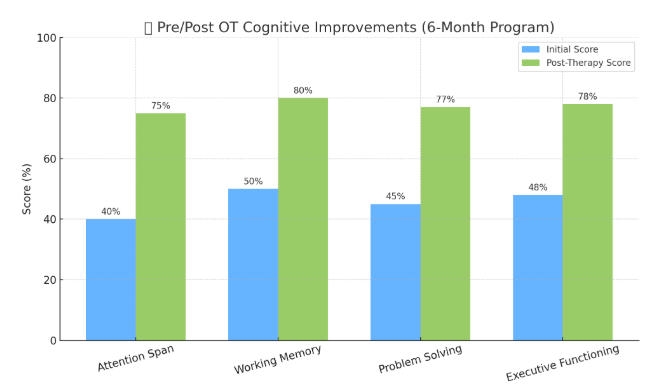
How Occupational Therapy Helps Kids with ADHD
- Occupational therapy (OT) is a powerful tool for children with ADHD, helping them navigate daily challenges at home, school, and in social settings. Here’s how it helps:
Key Benefits of OT for ADHD:
- Improves Focus & Attention
Therapists use routines, visual aids, and sensory tools (like fidget items or noise-reducing headphones) to reduce distractions. - Boosts Organization & Task Management
OT introduces planners, visual schedules, and checklists to help kids stay on track with school and daily routines. - Supports Emotional & Self-Regulation
Children learn calming techniques like deep breathing, movement breaks, or sensory activities to manage emotions and impulses. - Enhances Motor Skills
OT helps improve handwriting, posture, coordination, and fine motor control through hands-on activities. - Creates Structure at Home & School
Therapists work with families and teachers to set up ADHD-friendly environments for learning and daily living.
Supporting Cognitive Development at Home and in the Community
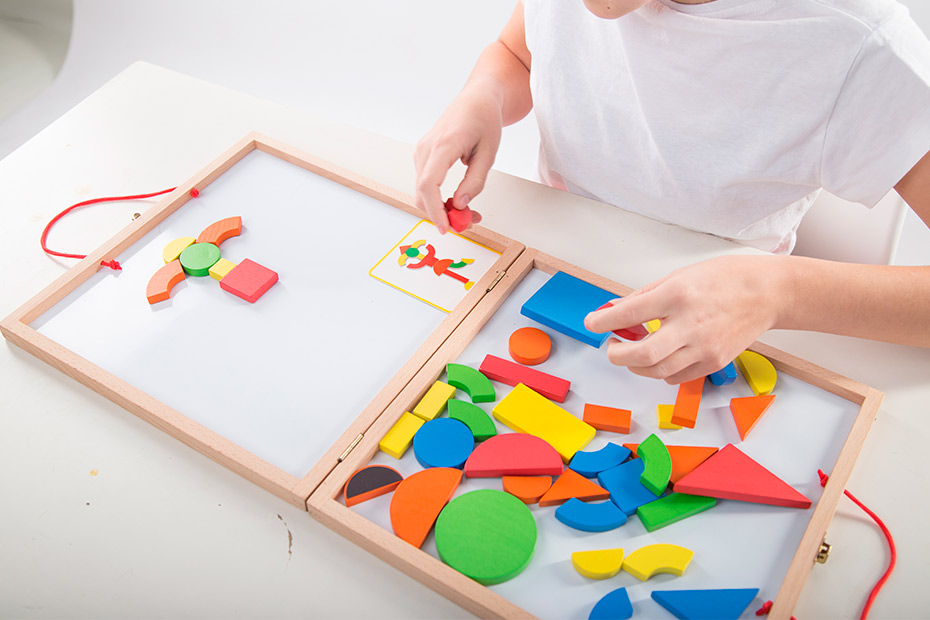
Occupational therapy doesn’t exist in a vacuum. The best outcomes happen when families, schools, and therapists work together to reinforce therapeutic goals in daily life. Consistency and repetition are essential in cognitive development: what’s learned in therapy needs to be practiced at home and school to “stick.” Between therapy sessions, the home becomes a child’s most important learning environment.
Home-Based Strategies for Parents
- Set Predictable Routines:
Children thrive on structure. A consistent daily schedule reduces anxiety and improves attention by providing a sense of control and order. - Use Visual Schedules and Checklists:
These help children understand what to expect and stay focused on tasks without constant reminders. Picture-based tools are especially helpful for non-readers. - Create Sensory-Friendly Spaces:
Minimize noise and visual clutter. Soft lighting, calming colors, and access to sensory tools like stress balls can improve concentration. - Play With Purpose:
Engage in memory games, simple puzzles, or cause-and-effect toys. These not only build bonds but also enhance cognitive flexibility and decision-making. - Collaborate With Teachers:
Ensure that what’s being worked on in therapy—such as time management or attention strategies—is reinforced in the classroom. Ask about IEP or 504 plans when applicable.
Community Stakeholders in Cognitive Development
Effective cognitive development in children extends beyond therapy sessions. It thrives when supported by a network of engaged stakeholders. A collaborative approach that includes families, educators, healthcare professionals, and community organizations ensures that therapeutic strategies are reinforced across all environments. This table outlines the key groups involved in a child’s cognitive development and the specific ways they contribute to sustained progress.
| Group | Contribution to Cognitive Support |
| Parents & Caregivers | Reinforce therapy through routine, structure, and play |
| Teachers & Schools | Collaborate on strategies and individualized plans |
| Pediatric Providers | Identify developmental delays and refer to OT early |
| Local Clinics | Provide therapy sessions and progress tracking |
| Community Organizations | Host awareness events and offer financial assistance |
Helping Young Minds Flourish

Pediatric occupational therapy offers an evidence-based, compassionate path forward for children struggling with cognitive challenges in the Rio Grande Valley. By improving attention, memory, problem-solving, and executive functioning, OT lays the foundation for academic and personal success.
Whether your child is facing attention issues, sensory sensitivities, or learning delays, early and consistent therapy, paired with community and family support, can lead to profound gains in independence and confidence.
Get Started with Tip of the Tongue Rehabilitation Services in the RGV
At Tip of the Tongue, we specialize in pediatric OT programs tailored to children across Pharr, Alton, McAllen, and Edinburg.
Our Approach Includes:
- Comprehensive developmental assessments
- Play-based, personalized therapy sessions
- Family education and support resources
- Collaboration with schools and educators
Contact us today for an evaluation and empower your child’s journey to independence.




